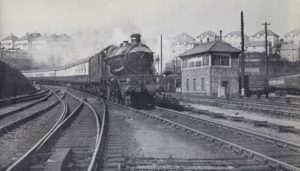
Once again, Tony Mansell leads us into his world of folklore, myth and legend involving an iconic bridge which really has left a lasting impression on him. This bitter-sweet love story was the winner of the Gorsedh Kernow 2010 – Short Story set in Cornwall.
My heart beats faster as I spot a column of smoke approaching, its pulse rhythmic, urgent. The down-train from Paddington is approaching the viaduct at the top of Pydar Street; a few seconds later it crosses its twin structure, high above Hendra. As it curves to enter the station I recognise the engine, an old friend, its number already entered in my book. I could have collected it fifty times, perhaps a hundred. Despite that, I am compelled to watch as it slows to a crawl alongside the platform. I can imagine the passengers donning their hats and coats, grabbing their cases. The more impatient already at the doors, slamming closed the windows, hands poised over the brass handles. Steam bursts from both sides of the engine as if to say, “I’ve made it”, a final act before it comes to a well-earned rest. People pour from the carriages and rush for the exit, their legs unsteady after hours of inactivity.
I look to the end of the bridge, there’s no sign of Pete and Mick. I told them I would be here; “Meet me on Black Bridge”, I said. Oh well, it’s their loss.
A whistle draws me back to the platform just in time to see the guard wave his green flag and clamber back on board. He must have the best job in the world, apart from the driver of course.
The snorting titan moves forward, smoke and steam belching, filling the air, masking my view of the city. I wait in anticipation. I have done this so many times but I still thrill at being enveloped in smoke, it’s the greatest joy of my young life. Suddenly I’m lost in a cloud, the smell and heat is everywhere, in my clothes, in my hair. I dread my mother’s reaction. The bridge shakes as the brown and cream carriages rattle beneath it. But then, there’s a different vibration: running feet. Pete and Mick have arrived, breathless. We all turn to watch as the train snakes around to enter the tunnel that leads it on its final stage of its journey.
Suddenly there is no smoke, no steam, just a lump of metal and plastic, as a nondescript diesel engine and its carriages disappear. I am alone, no Pete, no Mick, just me with my memories of over sixty years ago.
They’ll be having lunch now, back in the home. Roast pork, the same as last Tuesday and the Tuesday before. It’s always pork on a Tuesday. They’ve probably noticed my empty chair by now and run off to tell Matron.
“Check his room” she’ll shout, the cantankerous cow. I wouldn’t put her in charge of a cats’ home. They’ll soon give up looking and phone my nephew. He won’t be best pleased; he never is when I go missing.
I find myself smiling, even chuckling. Well, they never have time for any of us so a bit of panic will do them good. But I am not going back, not this time. I’d rather throw myself under one of these engines, even a diesel.
My mind slips back across the years again, to my early twenties, and I think of Emma. I see her face, her beautiful smiling face and her eyes, so full of love. She’ll soon be here, on the next train. Emma, such a pretty name. Emma and John, they go so well together and when we are married they’ll say, “There goes that Emma and John Mitchell, such a lovely couple”. There will be kids too, at least four and they will all be good looking, just like her.
A slamming door at the station draws me back, back to the reality of my drab existence. Life hasn’t worked out as we planned. Yes, I did marry but it wasn’t to Emma and I certainly wasn’t “happy ever after”. It lasted five minutes, or so it seemed, probably my fault, always comparing her with Emma. Yes, there were others, but they never meant enough to me to want to walk them down the aisle. There was no one who could replace my Emma.
The station is deserted now, not like when we were boys, when it was full of the sound of shunters. It bustled with porters rushing to and fro, moving trolleys loaded with boxes and parcels, cleaners with their polishing cloths and the Station Master pacing up and down, hands behind his back, inspecting every corner of his domain. We used to spend hours here on this bridge – this wonderful old bridge – just watching and collecting engine numbers. “Spotting” we called it. Pete and Mick were real characters, they got up to all sorts of mischief, me too I suppose. Pete was killed in one of the wars, can’t remember which one, but it all seemed a bit pointless. You go to school, fill your head with all sorts of knowledge and before you can use it you’re blown away. I remember I cried when I heard, “Pete, killed in action”. I don’t know what happened to Mick. I think his parents moved away and he went with them. He didn’t seem to want to keep in touch. It was Pete who was my special mate.
There’s a rumble in the distance, it’s the up-train from Penzance bringing my Emma. The smoke billows up from the cutting beyond the road. I love to see the engine break cover, its black face engulfed it its own smoke.

A whistle and more smoke, this time from the other track, on the city side of the station. A goods train on the down-line, a through-train, probably bound for Redruth or Camborne. Mothers race to pull their children back from the platform edge as it thunders through, its empty trucks rattling over the rail joints. The passenger train appears from the tunnel, it slows as it takes the long curve towards the station, I can see an arm waving. I don’t have to guess who it is. The goods train clears the platform, the last few trucks swaying wildly with the speed. I see them bouncing and then, suddenly, the last one jumps in the air and swings sideways into the passenger train. It gouges the side of the carriage like a giant claw and the impact hauls the other trucks off the rails. I watch, unable to move. The engine and three carriages stay upright but the last two are thrown on their side and dragged along the track. They come to a halt but then burst into flames. There are people trying to scramble out, desperate to escape the fire – not many do.
That was fifty years ago but I can still see it, the image is still with me. The fire, so fierce that there was little chance of rescue. I watched as the bodies were brought out, most of them beyond recognition. My eyes were glued to one particular compartment. As they carried her out I knew that it was the end of my life.
During the next few weeks I was in a daze. I considered jumping from Carvedras Viaduct but I’m a coward, I didn’t have the courage. Instead, I muddled on, tormented by what I had seen and by my thoughts of Emma. And now, as I approach the closing stage of my life, I dream of the end, a release from the anguish, a chance to be with her again.
The shouting from Station Road drags me back from my memories. Two angry faces – the matron and my nephew. They’ve come to take me back – back to the home. As I turn towards the other end of the bridge I see another figure. I blink and rub my eyes. It’s Emma, dressed in a white cloak, arms outstretched, beckoning. I call her name and try to run but my legs are weak. I’ve hardly moved before hands are pulling me back. I reach out but she is too far away. There is anguish in her eyes – and tears. I have failed her. She turns and slowly walks away, towards the steps at the end of the bridge. Soon she will disappear from sight.
“No”, I shout. “No, wait.” I am frantic to free myself, determined not to lose her again. Without Emma my continued existence is pointless. In desperation I swing my arms and somehow break free. My captors are taken by surprise and they stagger back, against the sides of the bridge: my bridge. Invisible magnets momentarily hold them and from somewhere I find the strength to run. Faster, faster, denying the frailty of my old body. Emma turns and smiles. There are no longer tears in her eyes, just love. We embrace and kiss, young lovers once again. We turn and watch as my pursuers slowly fade from view. I’m with Emma and this time it will be forever.

Tony Mansell is the author of several books on aspects of Cornish history. In 2011 he was made a Bardh Kernow (Cornish Bard) for his writing and research, taking the name of Skrifer Istori. He has a wide interest in Cornish history and is a researcher with the Cornish National Music Archive and a sub-editor with Cornish Story: an Institute of Cornish Studies initiative.

What an incredibly moving and sad story – it brought a tear to my eye.
Our beloved Black Bridge – I too have fond memories of it – I walked over it to go to school and was delighted when a steam train passed underneath and enveloping me in smoke. Later I walked over it to take my children to school too.